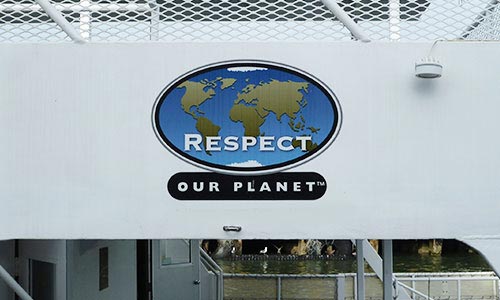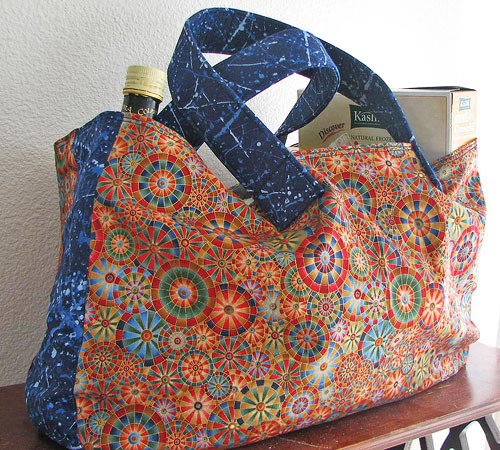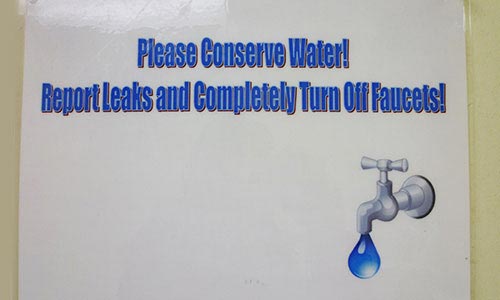
(Inspired by my recent travels in the U.S., today’s post is about waste. I can’t imagine this would be a popular topic but that doesn’t mean I shouldn’t write about it. This is equally important as other areas of personal growth. Read on.)
In the seven weeks I lived in New York City, one of the occupants in the apartment I stayed in, a local, was extremely wasteful. He had a habit of buying a lot of food while he was out, storing it in the fridge, and doing the same thing the next day — to the point where half the fridge would be filled with his food.
Since a lot of his purchases were takeout, they would go bad after a week and would eventually get thrown out, much to my horror. Bear in mind some of the food were literally untouched. I tried to salvage whatever I could by helping him finish the food, but a lot of ithad to be thrown away.
Having been brought up by my parents to be mindful of my consumption needs, I dislike wasteful behavior and was shocked by what I saw every day.
His wasn’t the only wasteful behavior I encountered. Another housemate I stayed with in NYC, a local too, would never pack food no matter how much food was left over. Whether we were eating in or out, regardless of how much food was left (we’re talking about good quality food that would make up another meal or two), he would throw them all away. One time there was about 30-40% of food left. Another time about 99% of the meal was intact as he had only taken 1-2 bites.
When I asked him why he wouldn’t take away the food, he said he just didn’t want leftovers. Even if the food was perfectly good for another meal, even if there was a lot of food left. If he ever wanted to eat something, he said he would want a new meal, be it getting it from the store or making it himself. I suspect it wasn’t just him — I observed the same behavior from the locals I met later on (even outside of NYC).
This is a sharp contrast from the people I met while in London, who would pack whatever food they could not finish, be it in a restaurant or at home. It could be at a Chinese restaurant with stir-fried food; at an Indian restaurant with naans, chickpeas, spinach, and curries; or at home with home-cooked meal. They would store it in the fridge, then have it the next day or later in the week. I was inspired by their spirit to save and conserve, and later cultivated the habit of packing my food in restaurants whenever I couldn’t finish the meal.
Whatever it is, it made me realize that beyond the States, all of us live in a very wasteful society today. It’s only a matter of relativity. And this inspired me to write today’s post on preventing waste in our world today.
The Epidemic of Waste
Here is a small fact sheet regarding waste which I reckon many of us don’t know about (and neither did I before writing this post). While many of the facts pertain to the U.S., we can take them as a directional guide for other parts of the world:
- Food Wastage Facts:
- As of 2011, 1.3 billion tons of food, or one third of the global food production, are lost or wasted annually.[1]
- Loss and wastage occurs in all steps in the food supply chain. In low-income countries, most loss occurs during production, while in developed countries much food is wasted at the consumption stage.[1]
- In US, a shocking 40% of food waste occurs at home. In a cross-country survey done among 400 US households, 93% of respondents acknowledged buying foods they never used.[2][3]
- Plastic Facts:
- Our consumption rate of plastic bags today is over 500 billion plastic bags annually. That’s almost 1 million plastic bags used every minute![4]
- According to The Wall Street Journal, the U.S. goes through 100 billion plastic bags annually (for shopping). An estimated 12 million barrels of oil is required to make that many plastic bags.[4]
- Plastic bags cause hundreds of thousands of birds, sea turtle and other marine animal deaths every year because these creatures mistake plastic trash for food.[4]
- On average, every household uses 500 plastic bottles each year, of which just 130 are recycled.[5]
- North Americans throw away 2.5 million plastic bottles every hour.[12]
- Paper Facts:
- A typical business office will produce about 1.5 pounds of paper waste per employee, per day.[7]
- The paper industry is the fourth largest contributor to greenhouse gas emissions among United States manufacturing industries.[6]
- Paper cups consume trees, water, and chemicals, and dump them into streams and landfills – they are not re-cyclable. Every year nearly 900 million trees are cut down to provide raw materials for American paper and pulp mills.[12]
- Half the world’s forests have already been cleared or burned, and 80% of what’s left has been seriously degraded.[6]
- Paper accounts for 25% of landfill waste (and one third of municipal landfill waste).[6]
- Water Facts:
- Up to 99% of the world’s water supply is unusable – it’s either salty or located in ice caps and glaciers. This means only 1% of water in the world is usable.[8]
- About 95% of the water entering our homes goes down the drain![9]
- The average person in the United States uses anywhere from 80-100 gallons of water per day (or 300-380 liters!). Flushing the toilet takes up the largest amount of this water.[10]
- Recycling Facts:
- Up to 60% of the rubbish that ends up in the dustbin could be recycled but isn’t. The unreleased energy contained in the average dustbin each year could power a television for 5,000 hours.[11]
- Every Sunday, more than 500,000 trees are used to produce the 88% of newspapers that are never recycled.[12]
- Other Facts:
As you can see, there is a huge amount of waste in our world today. This wastage doesn’t just apply to food. It also applies to plastic, paper, water, fuel, material items, and even waste itself (recyclable waste not being recycled).
Why Wasting Is Bad
While it’s obvious wasting is very bad, here are four key reasons:
- Environmental costs. The production of goods and industrialization of our society have resulted in a lot of damage to our environment today. Cutting down of rainforests, global warming, depletion of ozone layer, water/land/air pollution, the death of marine life from plastic pollution, and many more – these could be reduced if we cut down waste.
- Depletes precious resources. Our resources are rapidly depleting since we are using them much quicker than they can be replaced. The American Petroleum Institute estimated in 1999 the world’s oil supply would be depleted between 2062 and 2094, while Energy Information Agency estimated in 2005 the world has about 60 years of natural gas left. Soon we will not have enough to survive. While alternative fuel sources are being sought out, majority of the world are still reliant on conventional fuel sources, and there is no guarantee we can transition to these alternatives before the original sources are used up. What is much more helpful than reducing waste is if we don’t waste to begin with – by consuming only when we need to.
- Generates clutter. When we purchase things we don’t need, be it material goods or food, it creates unnecessary clutter. Why create the problem of clutter, only to have to spend time, money, and energy to declutter later on? All this can be avoided by not generating waste to begin with.
- Waste money. Last but not least, waste results in monetary wastage. Buying things we don’t need means wasting money. Disposing of things which we could have avoided buying in the first place costs money too.
Why We Are Wasteful
If wasting is bad, then why is there such a culture of waste today?
Firstly, materialism and consumerism. Materialism is the preoccupation with material goods, while consumerism is the practice of purchasing more and more goods. Both are prevalent in our society today, which is engulfed with the notions of “More and more” and “The newer, the better”.
Because of that, we would buy things without considering if we need them, which results in wastage because we never have a need for the things we purchase.
This could have been avoided if we did not acquire stuff we didn’t need in the first place.
Secondly, we are ignorant about the issues of waste.
Many of us are only aware what is involved in the consumption stage of goods, without knowing what it took to produce those goods or what happens when they are thrown away. We take for granted that the world will always be around, not knowing our resources are being rapidly depleted as we speak, or the harm we are inflicting on our world.
I was once one of these people too. Reckless shopping, buying clothes that I thought I might wear but would eventually not wear, throwing out clothes that I had never worn before, and then repeating the cycle all over again. This is part of the materialistic culture in my country. It would be a matter of time before I realized how wasteful this behavior was and how it could be prevented by being conscious of my consumption in the first place.
The fact sheet above is to give you a glimpse of the damage we’re creating today. But just as we created this waste, we can prevent it too. It all starts with us.
How to Prevent Waste: Your Handy Guide

In today’s guide, I’ll be sharing tips on how to prevent waste. These tips apply to all of us, regardless of who we are, what we do, and where we live. Because no matter we are from, there is always something we can to do help prevent waste.
1) Prevent Material Wastage
- Buy only what you need. Wastefulness is merely a symptom that we do not know what we need. Before purchasing, ask yourself:
- Do I need this? Our modern society has created a materialistic culture, where people are encouraged to buy more without thinking if they need any of these things. This is the case everywhere in technology, fashion, and consumer goods. Differentiate between needing and wanting something. Buy only if you need it.
- If you’re buying food, ask yourself the additional question of: Will I finish this? Buy only if your answer is “yes” to both.
- Make replacement purchases only if you need to.
- The acquaintances I mentioned at the start told me that they change a new laptop every 3-6 months, which I found shocking! When I asked them why, they say it’s not because their current laptop is spoiled, lost, or made obsolete, but because they can.
- Personally, I change a laptop once every 3-4 years, after it starts breaking down / becoming too slow for use. Bear in mind that my laptop is central to my business and crucial to my productivity. I only change mobile phones after a minimum of 3 years. The reason I get a new one each time is because the previous one got misplaced or it was spoiled.
- How often do you replace your items? To be honest, you don’t need that latest laptop/mobile/camera/watch/bag/wallet/clothing. Get it only if you have a real need for it. See the first point of this list.
- Celebrating special occasions:
- Learn to celebrate the occasion sans gifts. There is a message behind each occasion, and getting a gift is only one way of expressing the message. Learn to embrace and deliver the message without gifts, rather than rely on gifts to do the work.
- Consider alternatives to gifts such as acts of kindness, e-cards, heartfelt letters (or emails), fun-filled activities, or meal treats. These are environmentally conscious ways of celebrating the event.
- Buy gifts only if there is a need. If you absolutely have to buy something, do your research and ensure it’s something the person will use. The worst purchase is when you buy someone something for the sake of buying, and it’s not even something which the person want nor need. The best gift is when it’s something the person is intending to get for him/herself at some point anyway. This way, your gift has more meaning and will be put into good use.
2) Prevent Food Wastage
- Cultivate the habit of packing food. Pack food after each meal (at home or in the restaurant), if you have leftovers. Packing food is a very good habit as it helps save not only food, but also time and money from not having to get your next meal. Even if you don’t like the food, pack it for someone else who may want it.
- While you’re at it, bring your Tupperware whenever you go out. This way, you can easily pack food when needed, which will be handy since not all establishments provide packing boxes (such as food courts). Not only that, the reusability of the Tupperware means no wastage of packing boxes.
- Buy only what you need. Don’t buy food unless you’re absolutely sure (a) you’re going to eat it (b) you’re going to finish it. This is especially so for perishable food like fruits, vegetables, takeout and prepacked food. The acquaintance I mentioned in the opening would buy food without considering if he was going to finish it or not — in the end, it would get tossed into the bin because it had gone bad before he ever got to it. Not only did he waste precious food, but he also wasted money.
- Finish the food at home first before you buy more. Don’t buy food to stock up – we’re not entering a famine. Finish what you have at home first, then go grocery shopping.
- Omit food you don’t want. In restaurants, if there is something you don’t eat in a dish, ask the server to omit that. For example, I don’t like to eat rice. Hence, if my dish comes with rice, I would ask the servers to exclude that, as opposed to them serving rice and having it thrown away eventually because it is untouched. Fine if I’m paying the same price – the point is not to waste food.
3) Prevent Plastic Wastage

- Bring your own bag. One of the biggest material wastage is via carrier paper/plastic bags. When grocery shopping, set aside a big bag or a trolley for grocery shopping, and use this whenever you head to the supermarket. Supermarkets like Ralphs (in the west coast of the States) let you buy a large recyclable bag for $0.99 USD which you can use over and over again. When doing general shopping, put your purchases in bags you have on hand. Let the cashiers know you don’t need their bags.
- Save plastic cups.
- At the office. If you work in an office, you probably have a pantry, complete with a coffee maker, tea bags, a water dispenser and plastic/paper cups – whereby you use 2-3 cups a day for just drinking. The average American office worker uses about 500 disposable cups every year! In a global corporation with 100,000 employees, that’s 50 million cups wasted annually! Instead of using disposable cups, get a mug and use this for all your drinks from now on.
- Ordering at the cafe. If you order coffee/tea every day from the same cafe, keep the plastic cup and hand it to the server for your next orders. One cup a day adds up to hundreds a year. Starbucks has a program where you save 10 cents off your beverage when you bring your Starbucks reusable tumblers or travel mugs. Not only do you get to save the environment, you get to save your money too!
- Save plastic utensils. Every year, Americans throw away enough paper and plastic cups, forks, and spoons to circle the equator 300 times. Many of us use plastic utensils once and throw them away after 1 use, which is a big waste and totally unnecessary. Bring a set of utensils whenever you go out (fork, knife, spoon). Now, use this set instead of taking plastic utensils when you eat out. Wash/wipe it when you’re done, so you can reuse it the next time.
4) Prevent Paper Wastage
- Print only if you need to. Back when I was working in the corporate environment, a lot of paper was wasted every day printing material which was either used once or not used at all. If you have a presentation, have the audience refer to the screen instead. Print it only if you need it. A paperless office is the way to go in this new decade.
- Go for soft copy over hard copy. In many exercises on PE, I mentioned I use soft copies over hard copies – be it my life handbook, my project guidebooks, or when I do writing exercises. I find soft copy a superior choice, because (1) you can make changes easily (2) it’s environmentally-friendly (3) it provides formatting advantages over writing (4) it’s space-friendly – you can store it all in your laptop, whereas writing on paper/books means having to take them wherever you go (5) with Ctrl+F, it’s easy to look for what you need – whereas writing on paper requires a manual search, which can take a while if you have a lot of material to work through.
- Use rough paper if you need to write. If you really need to have a hard copy, then use rough paper as your first choice. There’s no need to buy a new fancy notebook or buy writing pads. Whenever I need to jot notes, I’ll take from the stack of rough papers I’ve collected over time.
- Use a handkerchief or towel – over paper napkins or tissues, which add up quickly. You use it once and throw it away, even though 90% is unused most of the time. Play a part in saving our rainforests. Use a handkerchief to wipe your hands/mouth (one side for each). Handkerchiefs used to be seen as old-fashioned and unhygienic, but I think it’s now the “in” thing to do. It’s reusable, a conscious choice, and cute too, if I may say so myself. At home, use a towel for cleaning. Put them away in the laundry basket when they are dirty. That way, you also save water.
5) Prevent Water Wastage

- Turn the tap tight every time. Make sure it does not drip. Fix your tap if it’s leaking – get a plumber or fix it yourself. A tap that drips one one drop a second wastes more than 600 liters a month, or over 7,500 liters a year! (Source: U.S. Geological Survey)
- Take short showers (3-4 minutes), over baths or long showers. Baths use nearly 2.5 times as much water as showers, while showers use 3-4 buckets of clean drinking water – every minute. (Source: Water Wise)
- When washing your face, use a basin and a sponge, rather than let the water run.
- Use a mug to rinse your mouth. Running the tap while brushing your teeth can waste 4 gallons of water. (Source: Huffington Post)
- At home, use the same set of utensils, plate and bowl. Wash them only if they are dirty. I realized a lot of us wash our utensils or put it away in the sink when it’s still perfectly clean. Most of the time, I use my plate or bowl as a place to hold my food (like fruits, vegetables, or bread slices) and they barely get dirty. Hence, I use them over and over, and wash them only when they are dirty.

- Do you know a full toilet flush can use up to 15 liters of water for every flush, whereas half flush uses less than 6 liter? (Source: Water Wise) When using the toilet, use a half flush if it’s number one (pee), and a full flush if it’s number two (poo). Install a dual-flush toilet system if you don’t already have one.
- If you use a dishwasher, turn it on only when it’s full. Not when it’s half-full.
- Do your laundry only when you have a maximum load. The same amount of water is used whether you’re washing only 1 underwear or one huge basket of clothes.
6) Prevent Fuel Wastage
- Switch off lights when no in use. Casper doesn’t need lights to see his way around.
- Switch off appliances when you’re not using them. Including TV, radio, and the computer.
- Don’t get a car unless you absolutely need to. Not only do you conserve the environment, you also save money, since having a car can be quite expensive, especially in places like Singapore, New York City, and London.
- Use alternatives to private transport. Such as the public transport, cycling, walking, or even car pooling. When I was in Holland, I was amazed at their culture of cycling. Not only does it help fuel conservation in the country, it also keeps everyone trim and fit – Holland is easily the country with highest proportion of fit people I’ve ever been to.
7) Other Tips To Prevent Waste

- Cultivate the habit of recycling.
- Did you know that… 1 recycled tin can would save enough energy to power a television for 3 hours? 1 recycled glass bottle would save enough energy to power a computer for 25 minutes? 1 recycled plastic bottle would save enough energy to power a 60-watt light bulb for 3 hours? And 70% less energy is required to recycle paper compared with making it from raw materials? (Source: Recycling Guide)
- When I was in Germany, I couldn’t help but notice recycling is such an integral part of German culture. Every German household has 2 bins: 1 for trash, and 1 for recyclable material. In public, there are always different bins for different recyclable materials. Not surprisingly, Germans lead the World in recycling, with 70% of their waste recycled every year. (Source: Trash Planet)
- The German’s recycling culture is something worthy of replicating. Get into the habit of recycling. Put aside recyclable waste and dispose of them in the appropriate recycling bins.
- Donate things you don’t need. For clothes, shoes, books, and other belongings that you don’t need, either (a) sell them on eBay (b) give them to someone you know who will have a use for them, or (c) donate them to the Salvation Army, orphanages or old folks’ home. Don’t throw them away or leave them lying around unused. You may not recognize this, but there are plenty of people out there who can benefit from them.
Closing Words
Change starts with you.
I imagine most, some of you might have skimmed through this guide, and went “Oh yeah, I do this, this and this – That’s enough.” or “This is boring stuff. Who cares about environmental conservation? Let others do the work.“
But no, this shouldn’t be the way. PE is about personal excellence, and personal excellence isn’t just about working on our lives, our careers, our health, and our relationships. That’s part of it, but not all of it. True personal excellence also includes knowing our place in this world, knowing the impact of our existence on others, and taking action to make the world a better place for all of us.
Let us all do our part in conserving our world. You will be amazed by how much change one person can effect. If each of us follows all the tips outlined in this tutorial, and in turn influence others around us to do the same, the impact would be staggering.
We only have one world to live in, so let’s not destroy it with our reckless behavior.
Get the manifesto version of this article: How to Prevent Waste [Manifesto]
(Image: Food wastage; Recyclable bag; Other images © PE)









 Thanks for reading. If you like my free articles, join my private email list and get my latest updates and articles sent right to your inbox.
Thanks for reading. If you like my free articles, join my private email list and get my latest updates and articles sent right to your inbox.